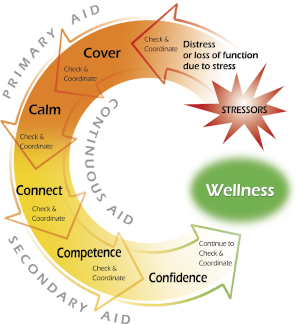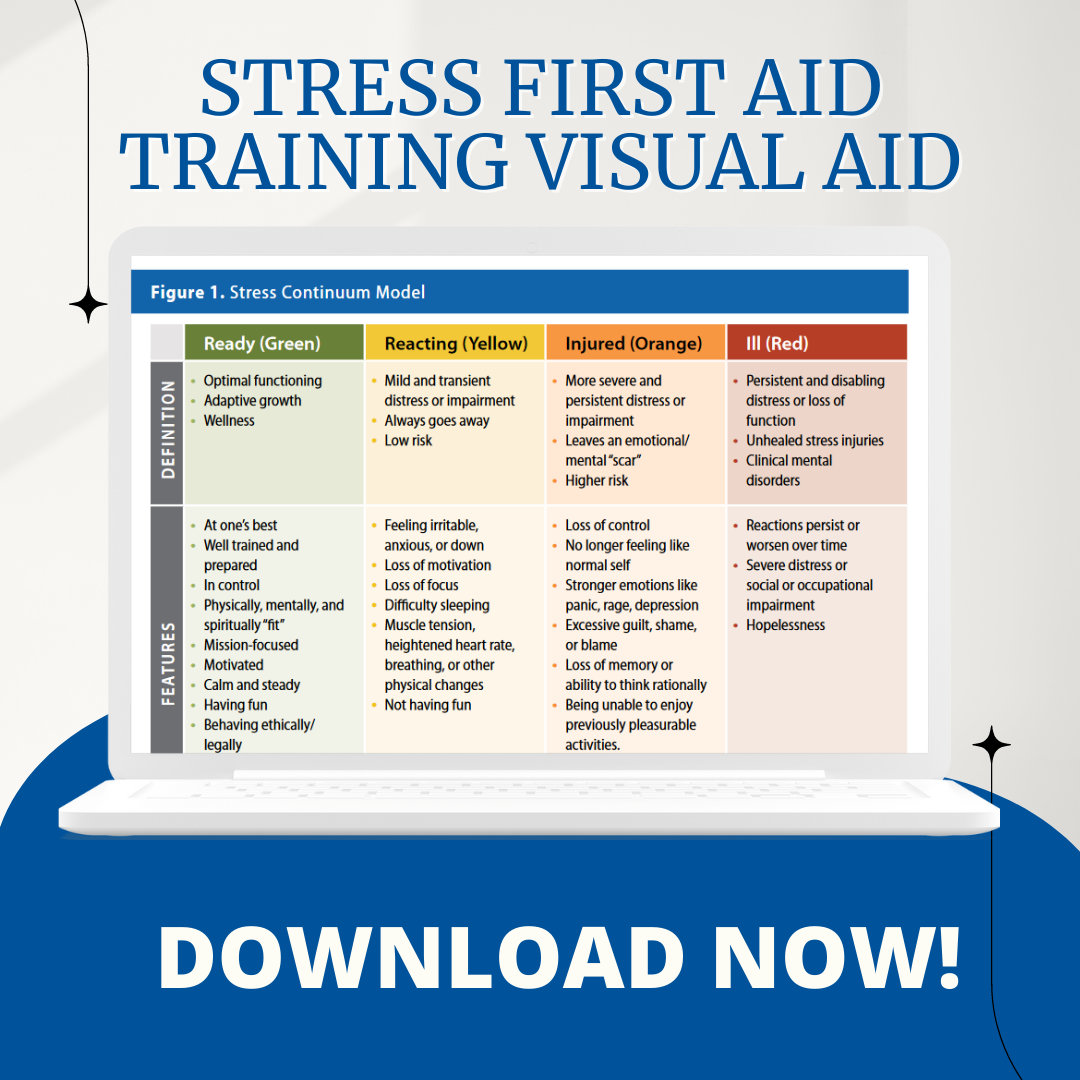The Stress First Aid Team has launched a Coursera Course: Stress First Aid for Healthcare Workers: A Peer Support Tool. Featuring Duke University School of Nursing's Own: Sean Convoy, Mary Barzee, Mitchell Heflin, and Bernice Alston. This online, self-paced course is FREE to the Duke Community
Stress First Aid Program

Widespread organizational and societal changes resulting from the COVID-19 pandemic have made stress management knowledge and skills more important than ever. Using the Stress First Aid framework and model, you can learn how to identify stress reactions in yourself and others, reduce the risk for stress injury, and promote coping and resilience among individuals and groups in social, occupational, and academic settings.
The overarching aim of Stress First Aid (SFA) is to identify and mitigate the negative impacts of stress before they impair health and well-being. SFA was initially developed under the auspices of the US military for implementation by the United States Navy and Marine Corps. It has since been successfully adapted for use by health care professionals and first responders across the country. The SFA model is based on five evidence-informed factors that help people recover from stress and adversity. These include the need for safety, calm, connection, sense of competence or self-efficacy, and hope.
What is SFA?
Stress First Aid is a peer support training designed to provide participants with a tool kit on how to perform a timely safety assessment and response when they suspect a co-worker or peer needs support. SFA trains peers to recognize and communicate about suspected psychological injuries with individuals with the goals of preserving lives, preventing further harm, and promoting recovery.
How to Sign Up for SFA Training
2026 SFA Training Dates
- Friday, February 6, 2026 - 9:00 am - 10:30 am
In Person - School of Nursing - Pre-Work required - Friday, April 10, 2026 - 9:00 am - 10:30 am
Virtual via Zoom - Pre-Work required
SFA Booster Sessions
If you have already taken the 4-hour Stress First Aid Training and you would like an opportunity to APPLY and practice the SFA model, these sessions are for you!
We offer a virtual 1-hour Booster session each month. These sessions are optional and no continuing education credit will be provided. You are welcome to attend any one of them – or more than one. The case studies have been developed with nursing students in mind, but should be applicable to all health care professionals.
During these sessions, we will reinforce the SFA principles: (Stress Continuum Model, four sources of orange-zone stress, and SFA model) and then practice using case exemplars from varied settings.
SFA Booster Session Dates for 2026:
Once a month - All Sessions are Virtual - Eastern Time Zoon
- Tuesday, February 10: 6:00 to 7:00 pm
- Wednesday, March 4: 12:00 to 1:00 pm
- Wednesday, April 1: 6:00 to 7:00 pm
- Wednesday, May 20: 12:00 to 1:00 pm
- Wednesday, June 10: 6:00 to 7:00 pm
- Wednesday, July 8: 12:00 to 1:00 pm
SFA Booster Facilitator Training
Twice a year, we work with future SFA instructors in small groups. These sessions are offered to those who have completed the 4-hour Stress First Aid session and are interested in bringing SFA to their professional group, department, or student group. Materials will be provided. We will review the principles of SFA, and practice teaching the concepts and facilitating application of peer support.
- Monday, April 13, 2026: 6:00 pm to 8:00 pm Eastern - Virtual
If you have questions about any of these SFA Training Opportunities, email the Stress First Aid Program.
Grow the Green
Looking for resources to help “grow the green”?
Duke Center for the Advancement of Well-being Science offers on-Demand Tools for cultivating gratitude, awe, simple joys, humor and mindfulness.
These resilience tools are evidence-based, interactive, and specifically designed for busy healthcare workers. Interventions last between 3–15 days. Participants will receive prompts for the tools via email or text message.
There is also a self-paced Well-B Webinar series where you can access practical tools and strategies for well-being you can use right away to emotionally support yourself and your team, department, unit, or organization.
HRSA Funding Statement
This project is supported by the Health Resources and Services Administration (HRSA) of the U.S. Department of Health and Human Services (HHS) as part of an award totaling $990,848 with 0 percentage financed with non-governmental sources. The contents are those of the author(s) and do not necessarily represent the official views of, nor an endorsement, by HRSA, HHS, or the U.S. Government. For more information, please visit HRSA.gov. U3NHP45396‐01‐00

